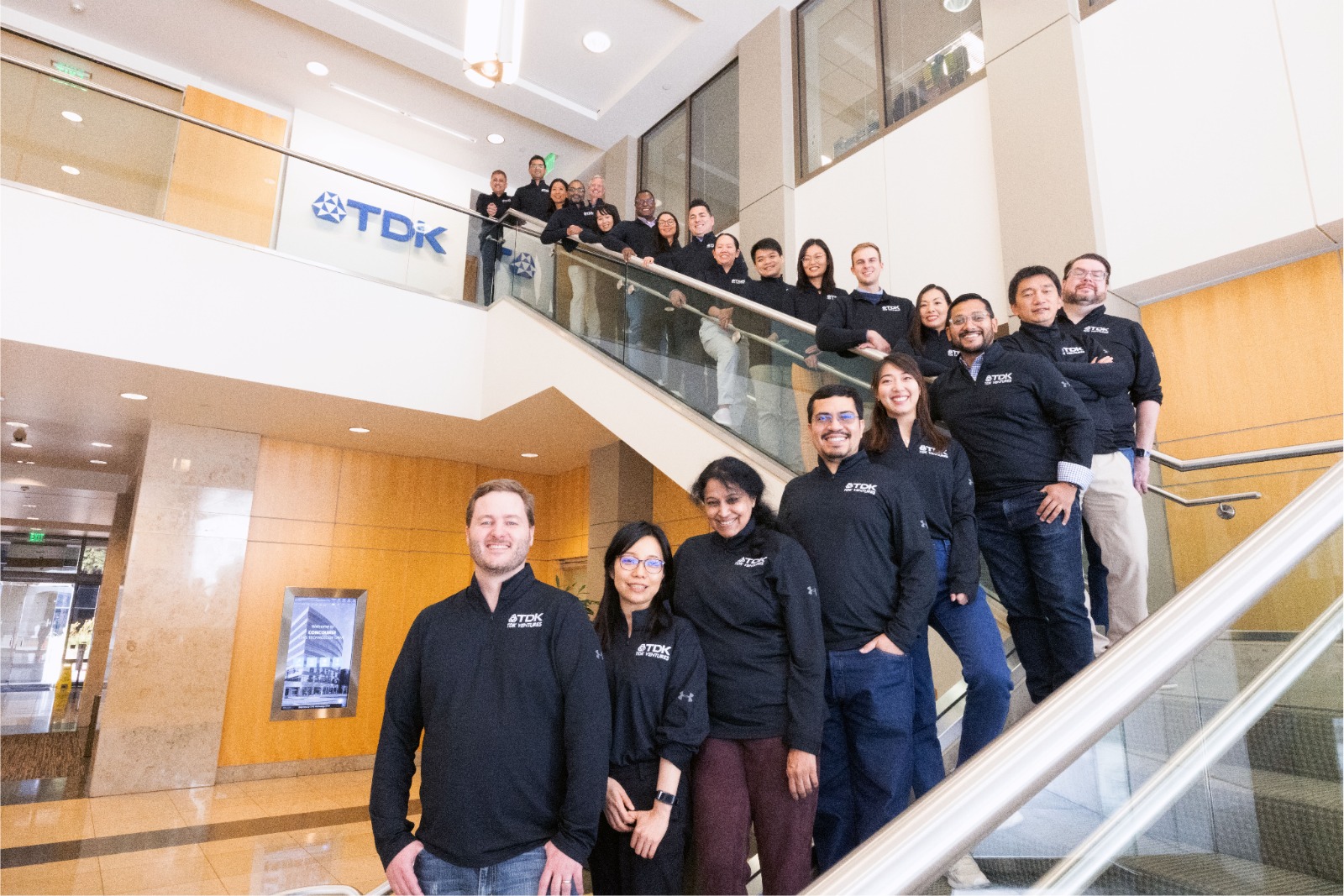Politics
The Role of Institutional Investors & Climate Risk
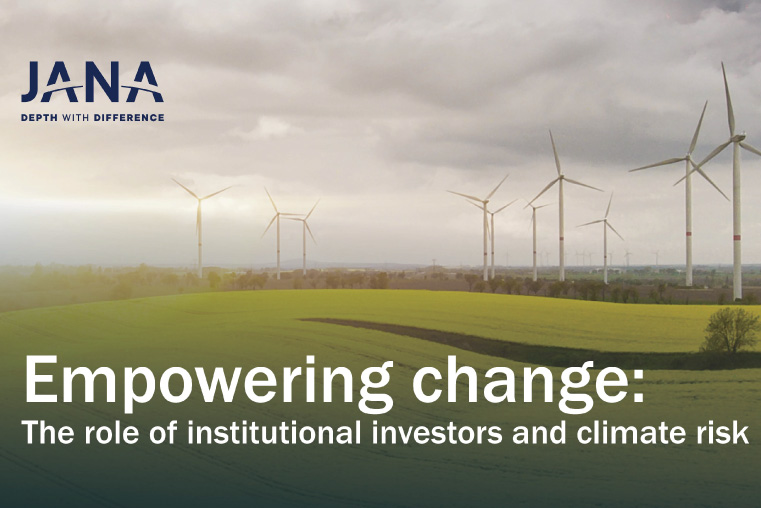
JANA partners with investment firms to find sustainable solutions to current challenges.
In today’s world, the perception of climate risk has evolved from being solely an environmental concern into a recognised financial risk. This has become so widespread that it has been incorporated into the regulatory frameworks of most developed nations. However, the real game-changer lies in the active involvement of institutional investors in the battle against climate change.
Governments across the globe have come to realise that their efforts alone are insufficient to effectively combat climate change. To meet ambitious net zero commitments, they require the private sector to step in and assume a pivotal role. This is where institutional investors come into play, armed with significant influence and capital, capable of driving change at scale and pace.
Investing with Purpose: JANA’s Role in Addressing Climate Risks
JANA Investment Advisers, Australia’s largest independently owned investment advisory firm, has been partnering with institutional investors for over three decades to deliver superior long-term investment results. As our social and physical environment grapples with unprecedented change, investors are increasingly searching for innovative and collaborative sustainability solutions. These solutions aim to shift the focus from merely considering Environmental, Social, and Governance (ESG) factors as a means of risk management in investment decision-making to actively pursuing real-world outcomes.
To achieve this ambitious goal, JANA collaborates closely with investors to integrate climate considerations into their investment strategies. This integration involves the incorporation of climate-aware capital assumptions and climate change scenario modelling. These efforts form a system-wide stewardship approach, ensuring that the interconnected aspects of the environment and society are considered alongside the pursuit of strong investment returns.
Strategic Investment Approaches for Ecosystem and Biodiversity Preservation
The crux of this approach lies in leveraging influence and capital while reviewing investment portfolios to protect ecosystems, biodiversity, and local communities. JANA’s approach comprises two fundamental strategies:
Influence: Institutional investors act as stewards of their entire portfolios, assessing the impact of companies from multiple angles, including climate, biodiversity, and human rights. Engagement with these investors becomes pivotal to elevating their ambitions across these various areas simultaneously. This process typically begins by addressing issues within sectors where more sustainable practices are readily available, such as the energy and mining sectors.
Capital: The focus is not merely on designating a small portion of the portfolio as “impact investments”. Instead, investors are encouraged to embed impact investments across all asset classes, making leaning into climate solutions a standard practice rather than a niche aspect of the portfolio.
The critical minerals industry is a notable example of where this comprehensive approach can be applied. This industry is set to play a central role in the transition to net-zero emissions and support Australia’s renewable energy journey.
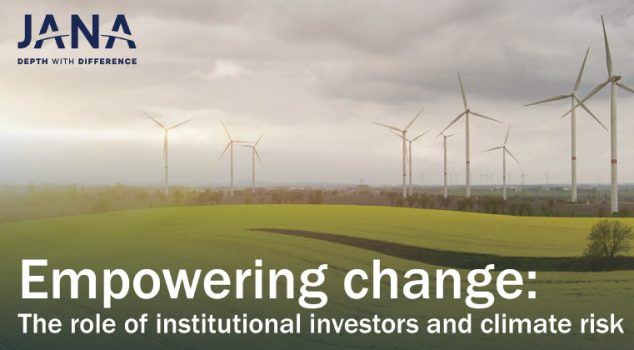
Redefining Investment Strategies for Sustainable Energy and Net-Zero Goals
As the world increasingly shifts toward cleaner and more sustainable energy sources, addressing climate change and achieving net-zero emissions remain paramount concerns for both the public and private sectors. However, the conventional approach of tackling climate change in isolation has limitations. It tends to ignore the adverse impacts on the very systems that need protection, including ecosystems, water resources, and local and First Nations communities. This compartmentalised approach also fails to capitalise on the opportunities for accelerated progress that could be harnessed by addressing these issues collectively.
By focusing on the responsible stewardship of the critical minerals industry, institutional investors have the capacity to demand a holistic consideration of the environmental, social, and cultural systems within which it operates. This ensures that the development and expansion of the critical minerals industry do not come at the expense of the nation’s biodiversity, freshwater resources, ecosystem health, or cultural heritage.
The fusion of financial acumen and environmental consciousness serves as a powerful catalyst for change in today’s world. Institutional investors, in collaboration with organisations like JANA Investment Advisers, are spearheading a transformation that goes beyond financial gains. It aspires to foster a harmonious coexistence between economic progress and ecological well-being, with an eye on the long-term sustainability of our planet and the prosperity of its inhabitants.
Find out more about COP28 campaign
Politics
Maintaining Excellent Standards for Industrial Sustainability
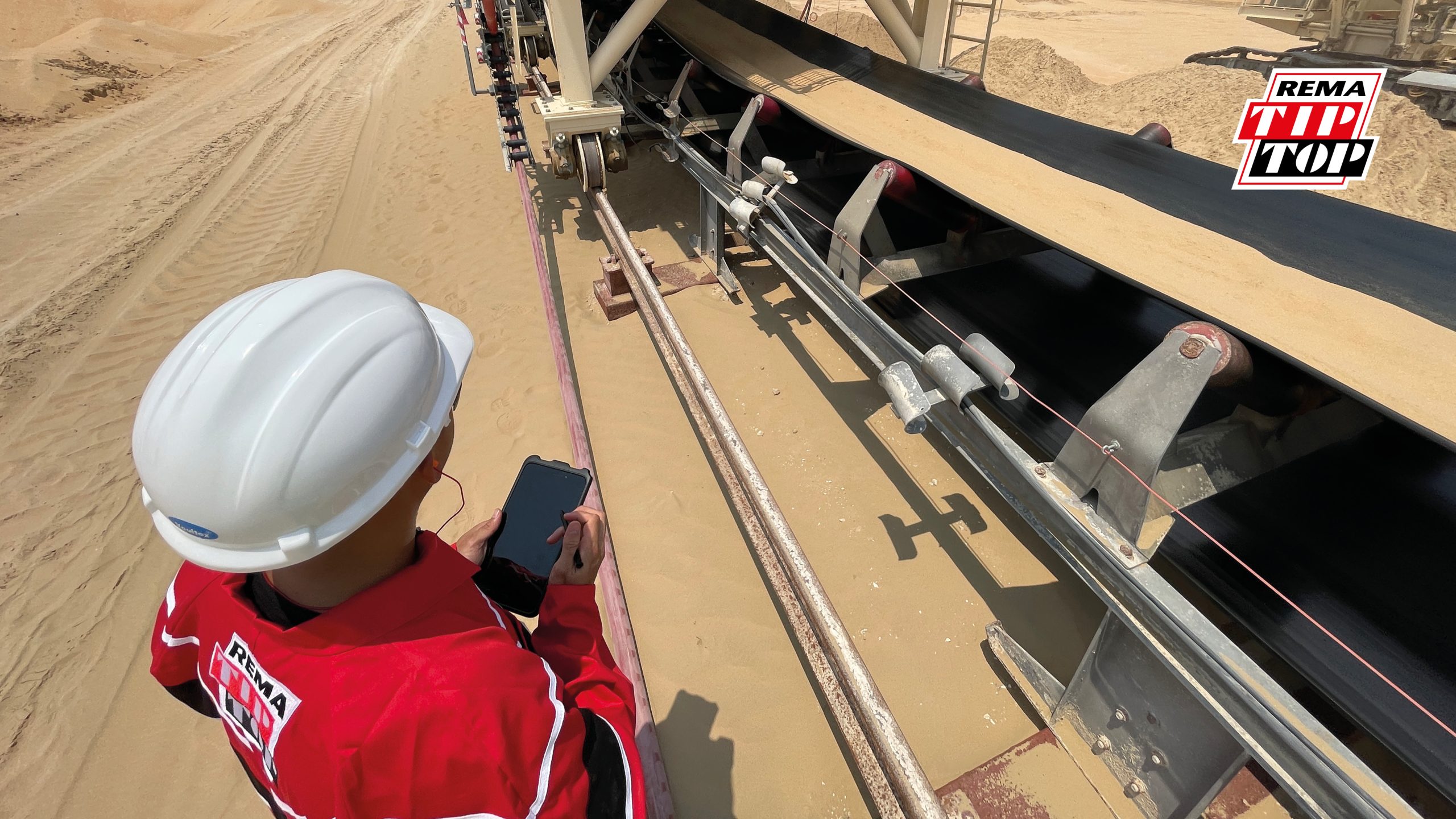
REMA TIP TOP commitment to sustainability
REMA TIP TOP is a globally operating system provider of services and products in the field of conveying and treatment technology as well as tire repair. For almost one hundred years, the company has built up unique expertise in materials development and industrial services and is active in the belting, material processing, surface protection and automotive sectors.
Global leader in industrial maintenance
As a global leader in industrial maintenance, REMA TIP TOP enables businesses in more than 170 countries to achieve their operational targets with a wide range of services, products and proven expertise. One of their vital goals is to advocate for industrial maintenance to prioritize repair and reuse over replacement to reduce material waste.
“Extending the life of industrial equipment is vital for both sustainability and efficiency,” says Michael Labbé, Executive Director at REMA TIP TOP. Sustainability does not just involve being kind to the environment but also being smart about resources and costs. This is where REMA TIP TOP’s maintenance experts come in and implement customer-specific strategies.
Sustainability is the responsible way forward
“We believe in sustainability because it’s the responsible path forward, both ethically and pragmatically. Our core mission is to provide outstanding solutions that genuinely benefit our customers. When we speak about sustainability, we’re talking about ensuring our customers’ long-term satisfaction, protecting the environment, and driving efficiency,” continues Michael Labbé.
Today, experts agree that predictive and monitoring strategies are more effective and sustainable than passive, corrective maintenance. Accordingly, maintenance is not a one-off project, but a continuous process that must be systematically managed. Consistency and discipline are the key factors in achieving excellent maintenance and operational results.
Repair and refurbishment over replacement of equipment
REMA TIP TOP’s maintenance services and solutions aim to support the circular economy. “Repair and refurbishment over replacement of equipment is our premise,” emphasizes Mario Delmaestro, General Manager Operations at REMA TIP TOP Middle East, who is a proven expert in comprehensive maintenance programs.
At REMA TIP TOP, a comprehensive maintenance plan begins with a detailed criticality plan, which serves as a guide for reliability-centered maintenance (RCM), preventive maintenance optimization (PMO), and failure mode and effect analysis (FMEA) plans. People are the most crucial component of any high-quality maintenance program, not only during the development phase but throughout the entire operational cycle.
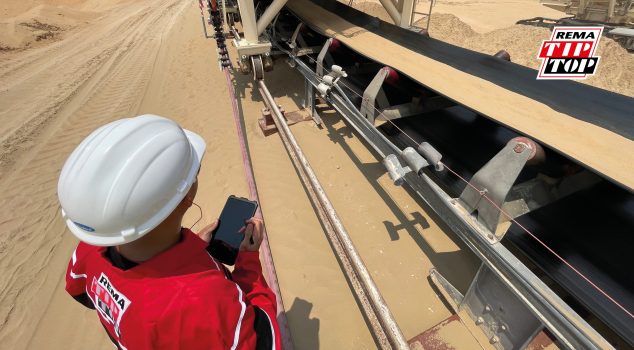
Longer service life means less impact on the environment
By extending the lifespan of machinery and improving its efficiency, companies can lessen the strain on the environment, decreasing the need for new resources and minimizing waste. This approach enhances efficiency, reduces energy and resource consumption, benefiting both the environmental and the economic aspects.
To improve the operational reliability and sustainability of industrial plants, REMA TIP TOP offers its customers a full maintenance service, ranging from comprehensive inspections, repairs and modernizations, eco-friendly products and materials to tailored strategies to increase efficiency. Highest maintenance standards meet almost 100 years of experience.
Find out more about COP28 campaign
Politics
ACEN’s Energy Transition Journey
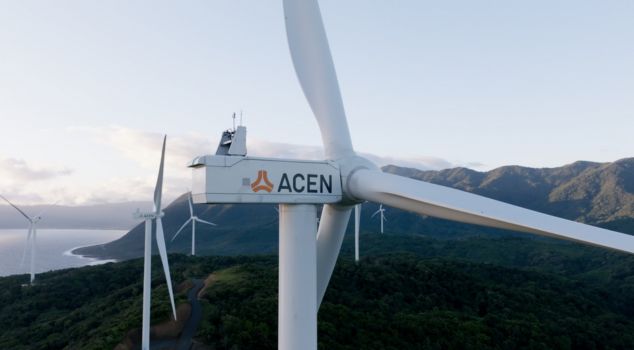
ACEN is the renewable energy platform of the Ayala group.
In 2019, Ayala acquired a listed energy platform and thereafter infused its Philippine renewable operating assets and development pipeline. The combination resulted in 532MW of generation portfolio in the Philippines, consisting of a 246MW Coal fired power plants (CFPP), 134MW of various diesel plants, and 152MW of various renewable energy plants.
The listed platform, ACEN, aspires to blaze the trail in energy transition across Asia Pacific. ACEN committed to Net Zero GHG by 2050, and is transitioning to 100% renewables generation by 2025. The company initially set a bold target of reaching 5GW of renewables by 2025.
ACEN currently has over 4500MW of attributable capacity of which 98% is from renewable sources. In the last five years, the company expanded beyond the Philippines and has meaningful presence in Australia, Vietnam, Laos, Indonesia, India and the US.
Pioneering Energy Transition Mechanism Initiative
Energy transition requires both the scaling up of renewables and the orderly retirement of fossil fuel plants, with primary focus on CFPPs and diesel plants.
To this end, ACEN focused on scaling up its solar and wind energy investments and pipeline development over the last 5-6 years, and expanded its geographic footprint. The company’s attributable renewables capacity for projects in operations and under construction increased from 152MW to over 4400MW today. ACEN recently announced its 2030 vision which is to reach 20GW of renewables capacity by 2030.
Aside from scaling up renewables, ACEN is also pioneering initiatives in early coal retirement. The company successfully implemented the world’s first market-based Energy Transition Mechanism which reached financial close in November 2022.
The transaction involves the divestment and early retirement of the 246MW coal plant, and its transition to cleaner technology by 2040 when the CFPP completes 25 years of operations. As the operating life of CFPP’s typically reach up to 50 years, the groundbreaking ETM initiative reduces up to 50mn tons of carbon emissions.
The company may also follow a similar approach with its remaining diesel plants. Other legacy diesel plants have already been decommissioned or divested in the last two years.
The ADB promoted the ETM concept, which leverages public and private investments with the aim of retiring coal power assets on an earlier schedule than if they remained with their current owners. ACEN decided to apply the ETM concept to the divestment of its 246MW CFPP. 100% of the net proceeds to ACEN will be used for renewable energy investments.
ACEN’s ETM was supported by debt and equity investors from the Philippines, with a total transaction value of USD 310mn. Proceeds from the ETM were used to refinance the debt, cover transaction expenses, and generate ~P7.2bn of proceeds to ACEN that will enable construction of renewable energy plants.

Energizing Change: Actis at the Forefront of Sustainable Development and COP28 Initiatives
The COP28 conference offers a huge opportunity to advance the commitment to global climate mitigation and adaptation strategies. In addition, the concept of a Just Transition – one that is carried out in an equitable manner and takes into consideration issues such as gender equality, the social context, and local employment – rightly looms larger than at any prior COP. And, given the event is being held in a region which leads world hydrocarbon output we expect a sharpened focus on transitioning out of a fossil fuel-based economy to a clean energy-based one.
Actis is already playing a significant part in helping meet the world’s climate goals. We are one of the leading investors, developers and owners of clean energy in the emerging markets. We have built 35 energy generation companies since inception, 20 of which are renewable generation businesses. We have owned and operated around 20,000 MW of clean energy across Africa, Asia and Latin America. We have contributed to the avoidance of over 30 million tonnes of CO2. We have a focus on impact, and sustainability is at the heart of everything we do. We are firm believers in the notion that values drive value; that our focus on driving for sustainability outcomes also drives financial value.
Find out more about COP28 campaign
Politics
Building Sustainability Leaders
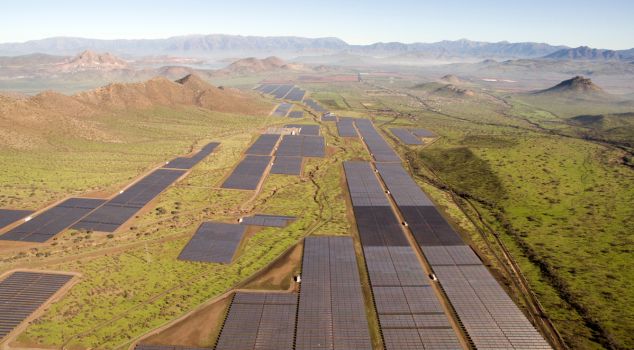
The world’s sustainability challenges are ever more evident. Whether it is climate change, inequality or biodiversity, sustainability issues have never been more important to social and economic prosperity. Ensuring the creation of fairer and more sustainable societies that meet the needs of a growing global population is therefore a critical goal.
Shaping a Greener Tomorrow: Actis’ Commitment to Sustainability and Renewable Energy
At Actis, sustainability is embedded in our DNA. Either by investing in businesses that create solutions to global sustainability challenges, or working with those businesses to turn them into sustainability champions, our aim is to transform infrastructure for a better tomorrow.
Actis’ Global Impact: Leading the Charge in Sustainable Infrastructure and Clean Energy
That means we invest in sectors such as sustainable infrastructure, new economy real estate and renewable energy in some of the world’s fastest growing markets. Whether it is sustainable data centres that bring the benefits of connectivity to millions, or renewable power projects that support the drive to net zero, we invest in businesses which will be critical in meeting the world’s demands.
Our approach at Actis supports COP28’s four pillars of climate action: fast-tracking the move to a low-CO₂ world, improving climate finance, focusing on people, lives and livelihoods, and ensuring full inclusivity.

Energizing Change: Actis at the Forefront of Sustainable Development and COP28 Initiatives
The COP28 conference offers a huge opportunity to advance the commitment to global climate mitigation and adaptation strategies. In addition, the concept of a Just Transition – one that is carried out in an equitable manner and takes into consideration issues such as gender equality, the social context, and local employment – rightly looms larger than at any prior COP. And, given the event is being held in a region which leads world hydrocarbon output we expect a sharpened focus on transitioning out of a fossil fuel-based economy to a clean energy-based one.
Actis is already playing a significant part in helping meet the world’s climate goals. We are one of the leading investors, developers and owners of clean energy in the emerging markets. We have built 35 energy generation companies since inception, 20 of which are renewable generation businesses. We have owned and operated around 20,000 MW of clean energy across Africa, Asia and Latin America. We have contributed to the avoidance of over 30 million tonnes of CO2. We have a focus on impact, and sustainability is at the heart of everything we do. We are firm believers in the notion that values drive value; that our focus on driving for sustainability outcomes also drives financial value.
Find out more about COP28 campaign
-
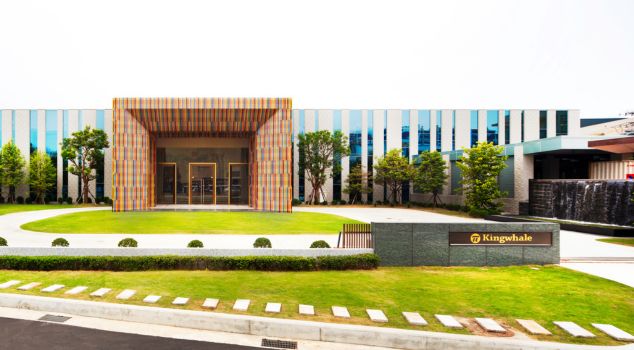
 Politics2 years ago
Politics2 years agoSustainable Roadmap – A Better Future for All
-

 Politics2 years ago
Politics2 years agoACEN’s Energy Transition Journey
-

 Politics2 years ago
Politics2 years agoTech Platform with A Clear Vision: A Waste-free World
-

 Politics2 years ago
Politics2 years agoMaintaining Excellent Standards for Industrial Sustainability
-

 Editorial Picks2 years ago
Editorial Picks2 years agoCreate Impact Through Storytelling
-

 Entertainment2 years ago
Entertainment2 years agoCatalysts of Change: Venture Capital in Shaping Global Innovation Ecosystems
-

 Entertainment2 years ago
Entertainment2 years agoInnovating in impact investment
-

 The Forum Interviews2 years ago
The Forum Interviews2 years agoHAYAH Insurance: Pioneering Innovation in MENA region

